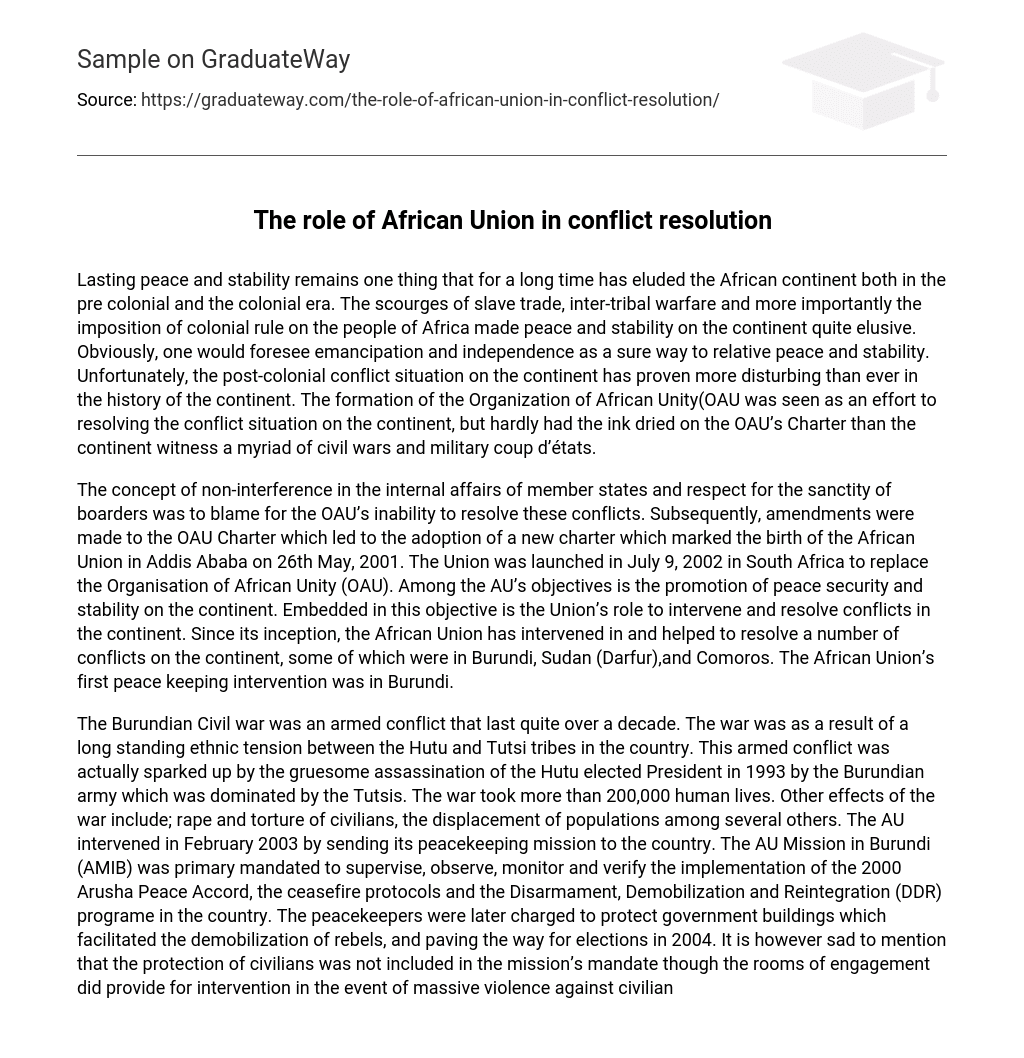Lasting peace and stability remains one thing that for a long time has eluded the African continent both in the pre colonial and the colonial era. The scourges of slave trade, inter-tribal warfare and more importantly the imposition of colonial rule on the people of Africa made peace and stability on the continent quite elusive. Obviously, one would foresee emancipation and independence as a sure way to relative peace and stability. Unfortunately, the post-colonial conflict situation on the continent has proven more disturbing than ever in the history of the continent. The formation of the Organization of African Unity(OAU was seen as an effort to resolving the conflict situation on the continent, but hardly had the ink dried on the OAU’s Charter than the continent witness a myriad of civil wars and military coup d’états.
The concept of non-interference in the internal affairs of member states and respect for the sanctity of boarders was to blame for the OAU’s inability to resolve these conflicts. Subsequently, amendments were made to the OAU Charter which led to the adoption of a new charter which marked the birth of the African Union in Addis Ababa on 26th May, 2001. The Union was launched in July 9, 2002 in South Africa to replace the Organisation of African Unity (OAU). Among the AU’s objectives is the promotion of peace security and stability on the continent. Embedded in this objective is the Union’s role to intervene and resolve conflicts in the continent. Since its inception, the African Union has intervened in and helped to resolve a number of conflicts on the continent, some of which were in Burundi, Sudan (Darfur),and Comoros. The African Union’s first peace keeping intervention was in Burundi.
The Burundian Civil war was an armed conflict that last quite over a decade. The war was as a result of a long standing ethnic tension between the Hutu and Tutsi tribes in the country. This armed conflict was actually sparked up by the gruesome assassination of the Hutu elected President in 1993 by the Burundian army which was dominated by the Tutsis. The war took more than 200,000 human lives. Other effects of the war include; rape and torture of civilians, the displacement of populations among several others. The AU intervened in February 2003 by sending its peacekeeping mission to the country. The AU Mission in Burundi (AMIB) was primary mandated to supervise, observe, monitor and verify the implementation of the 2000 Arusha Peace Accord, the ceasefire protocols and the Disarmament, Demobilization and Reintegration (DDR) programe in the country. The peacekeepers were later charged to protect government buildings which facilitated the demobilization of rebels, and paving the way for elections in 2004. It is however sad to mention that the protection of civilians was not included in the mission’s mandate though the rooms of engagement did provide for intervention in the event of massive violence against civilians (africafoucus.org). Though the AU mission in the country was able to end combat between the government and the FDD rebels, the mission faced the difficulties in resolving issues such as the restructuring of the national army, and the peacekeepers could also not move forward with programmes intended to demobilize and integrate combatants.
Another important intervention of the AU that is worth examining is the Darfur conflict situation. The war began when in February 2003 when the Sudan Liberation Movement and Justice and Equality Movement groups in Darfur took up arms, accusing the Sudanese government of oppressing non-Arab Sudanese Arabs (www.wikipedia.com) The insurgence took over thousands of human lives, displaced populations and forced thousands into refugee camps leading to a large humanitarian crisis which many regarded as a genocide. The African Peacekeeping mission started in 2003 when it helped attained a ceasefire between the government of Sudan and rebel groups. The African USnion initially started with an observer mission and later made presence more solid by including soldiers and the police force. By the close of 2005, the AU had about 7000 troops in Darfur(www.africafocus.org) The AU’s military intervention was met with some reservation as experts thought the force was under-trained and under-resourced. A joint AU/UN peacekeeping force was deployed to Darfur in the beginning of 2008.
Quite apart from the Burundi and Sudanese conflicts the AU played a role in resolving is the Comoros conflict situation. This military intervention of AU forces in Comoros was done upon the request of the Comorian government to help restore the authority of the central government over the breakaway island of Nzwani. The AU’s objective was to oust Colonel Mohamed Bacar’s leadership in Anjouan when he refused to step down after a disputed election in defiance of the federal government and the African Union. Libya, Senegal, Sudan, and Tanzania volunteered troops for the mission and France offered to transport the Senegalese and Tanzanian contingents. Tanzania ultimately contributed 750 soldiers to the effort, with the other three African countries sending more modest numbers to join the 1,000-strong army of the Comoros in facing off the estimated 300 members of Anjouan’s gendarmerie. Largely, the mission was successful even though it led to a number of casualties and losses.
In conclusion, even though the AU has a lot of problems particularly in the areas of funds and logistics and has been heavily criticized in some of its methods of conflict resolution, on a whole its interventions have helped curb the dreadful effects of conflicts in the African Continent.





